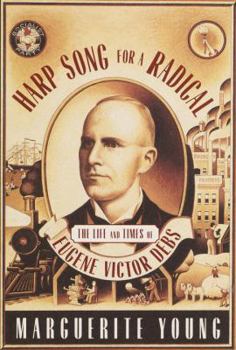Harp Song for a Radical: The Life and Times of Eugene Victor Debs
An extraordinary literary accomplishment, thirty-five years in the making, from the greatly admired author of Miss Macintosh, My Darling ("A work of stunning magnitude and beauty" --New York Times... This description may be from another edition of this product.
Format:Hardcover
Language:English
ISBN:0679427570
ISBN13:9780679427575
Release Date:September 1999
Publisher:Alfred A. Knopf
Length:624 Pages
Weight:0.55 lbs.
Dimensions:1.6" x 6.7" x 9.6"
Customer Reviews
1 rating
A lyrical history of the early American labor movement
Published by Thriftbooks.com User , 21 years ago
Looking at the other customer reviews for this unusual book, I doubt that the reviewers either read the introduction or that they actually read more than a few pages. This is not a conventional biography. Nor is it a completed, polished work. Marguerite Young died when her biography of Debs was incomplete and very much a work in progress. Had she lived to complete it, it would have been a fuller picture of his life. But her idiosyncratic approach would still have colored every page. It is also helpful to understand that in writing one of her previous books--"Angel in the Forest"--Young started out writing a lengthy poem, then converted it into a prose work. (The Debs book is in some ways reminiscent of Stephen Vincent Benet's "John Brown's Body," only Young employed blank verse.)The Debs book has been described as Whitmanesque, and it is reminiscent of both the poetry and prose of that pillar of American literature. As both a poet and prose writer, Young takes a lyrical, almost stream of consciousness approach in this book. (Her work has also been likened to James Joyce's--a comparison she apparently disliked, though it strikes me as appropriate.) Those who criticize the book for its rambling style seem to miss this point.Others have suggested that the book might better be entitled "The Times and Life of Eugene Victor Debs." In her unconventional approach, Young does seem to focus more on a history of the times in which Debs lived than on the man himself. The book pays particular attention to the socioeconomic and political developments which shaped the industrial revolution in this country, particularly the American labor movement. The author is at her best when documenting industrial accidents and working conditions and in describing the dominance of American "captains of industry" over both the economy and the American government at all levels.Those who find Part One of the book--the first 178 pages--difficult to read might be advised to read the first 21 pages, then skip to Part Two, which is more focused on Debs and his times. Part One of the book admittedly becomes bogged down in describing utopian socialists--it gives far too much attention to the obscure German immigrant socialist Wilhelm Weitling as well as delving into the detailed history of early Mormonism, a topic which apparently fascinated the author because Brigham Young was one of her ancestors.Part Two of the book is also sweeping in its scope, but it provides a memorable description of the early decades of Debs' life (with emphasis on 1855-1877), tracing the emigration of his parents to the U.S. from Alsace Lorraine, describing the influence of his parents' radicalism on his own personal beliefs, and detailing his work as a railroad laborer and union organizer. It does this against the backdrop of the Civil War, the Lincoln Assassination, Reconstruction, the Indian Wars, national politics, and labor developments, culminating in the violent railroad strikes of 187





